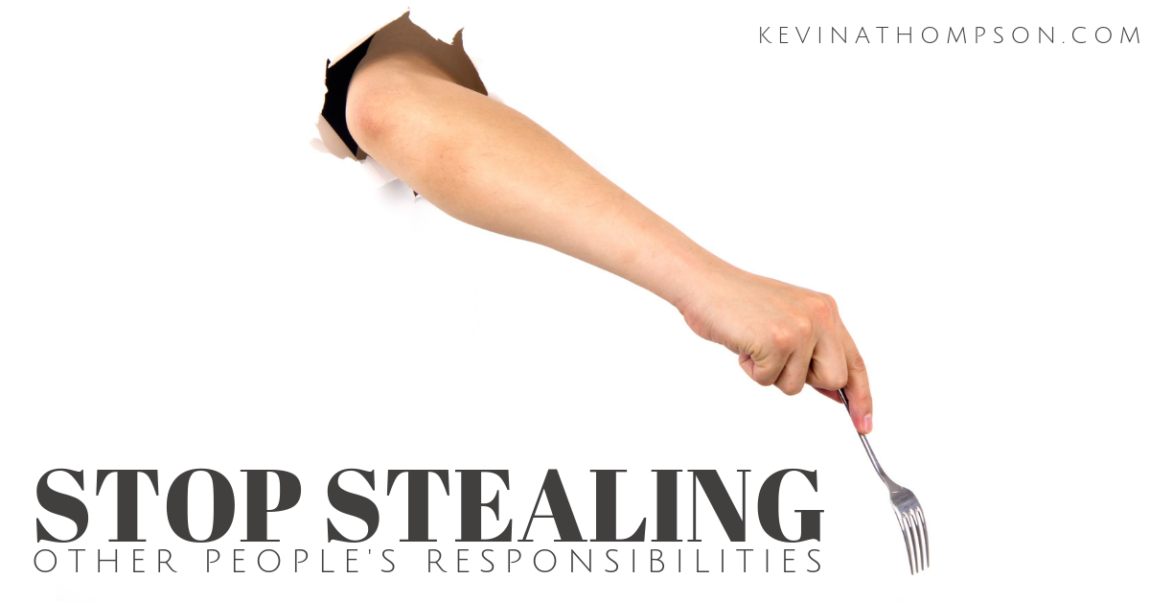There’s an old leadership principle for those who oversee employees. When someone who reports to you comes to your office with a problem, make sure they don’t leave it on your desk. Listen to them. Give direction. Assist them in considering a solution. But do not allow them to leave without taking the problem with them.
The advice sounds selfish. It seems to imply that your time is more precious than the time of those who report to you. But that’s not the point. The advice is based on the idea that if employees get in the habit of leaving you with all their problems, you will eventually be overwhelmed with issues and they will never learn how to lead on their own.
A core element of leadership is learning how to help others without becoming so enmeshed with them that we try to own what is rightfully theirs. This is also a key skill in life.
Own What Is Yours
Personal responsibility is a vital element to living an empowered life. We must control what is rightfully our responsibility. When a person fails to take personal responsibility, we delegate to others what should be ours. We must make our own decisions, define our own happiness, and exercise our personal freedom to create the life we desire. While we do not control everything in our lives, we control far more than we realize. Owning our personal responsibilities is key to owning our lives.
But Nothing Else
The problem with personal responsibility is that we often fail to own what is ours, but we attempt to own what belongs to other people. We worry about their lives, try to manipulate their decisions, and take on their guilt. Rather than developing proper boundaries, we regularly walk into the office of their lives and take their problems off their desk. We make their problems our problems.
This is a recipe for failure and frustration. When we attempt to own what is not ours to own, it causes relationships to fail and frustrates everyone involved.
We must own everything that is ours, but nothing else. Because our responsibilities are so great and our abilities are so limited, we cannot afford to take on the responsibilities of others. We can only own what is rightfully ours.
Ask This Question
If I walk into someone’s office, I know that I should not take the pictures on their desk. They don’t belong to me. It would be inappropriate to take what isn’t mine. When considering which responsibilities I should own and which I should refuse, I should regularly ask a simple question:
What’s theirs?
These two simple words will help me to remember that some things do not belong to me. By asking myself “What’s theirs?” I can distinguish between the things I rightfully own and which things I must allow others to keep.
I must allow other people to own their own:
Actions. I can’t force anyone to do anything. They have the full responsibility for the actions they take.
Attitudes. While I can influence someone’s attitude, I do not get to determine it.
Decisions. Some choices simply are not mine. Even if I don’t agree with what someone decides, it is their right to make those decisions.
Consequences. Choices have consequences. To remove the rightful consequences from someone’s choices is to involve myself in a way that is not appropriate.
Ultimately, I must honor another person’s sense of self. Their life is not my life. While I want to help others, I cannot allow my help to become a hindrance. Anytime I attempt to own something that is not mine, my actions are hurting the other person and myself. No matter how noble my actions may appear, they are not loving.
Of course, there are times in which another person is not capable of making their own choices. We all will face times in our lives in which another will need to have control over us. Children are not capable of making wise decisions. Medically we will face times in which we need another to advocate on our behalf. Some experience special needs which require the involvement of others. However, most adults should be fully responsible for their own lives. To remove some of those responsibilities from them is an act of theft. We are taking what is not rightfully ours.




5 Responses to Stop Stealing Other People’s Responsibilities